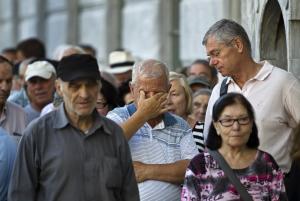ATHENS, Greece (AP) — Greece's liquidity-starved banks got a new cash injection from the European Central Bank on Wednesday, hours before a key vote in parliament on further economic reforms demanded by international creditors in return for a third bailout.
A European banking official told The Associated Press the ECB decided to increase emergency liquidity to Greek banks by 900 million euros ($980 million) — the second such cash injection in just under a week.
Fearing a run by depositors flocking to take their savings out of Greek banks, the government imposed capital controls more than three weeks ago, restricting daily withdrawals to 60 euros ($65) per account holder. Extra ECB liquidity means that Greek banks will still be able to hand out cash.
Prime Minister Alexis Tsipras' radical left-led government faces its second crunch test in parliament in a week later Wednesday. Failure to pass the economic measures could undermine his coalition and trigger fresh fears over the country's future in the shared euro currency.
The vote on changes to Greece's judicial and banking sectors is one of the requirements that Greece's European creditors have insisted upon in order for negotiations on a third bailout for Greece worth around 85 billion euros ($93 billion) to begin.
After losing the support of a large chunk of his own party's lawmakers during a vote last week on a creditor-demanded austerity measures, Tsipras has to rely on support from pro-European opposition parties to pass measures.
View gallery

Greek Finance Minister Euclid Tsakalotos speaks during a parliament committee in Athens, Wednesday, …
Many in Tsipras' Syriza party, including former finance minister Yanis Varoufakis, voted against last week's austerity measures, which included big increases to sales taxes that took effect on Monday. If more than a handful of others join the dissent in Wednesday's vote, then Tsipras' government could be in trouble.
At least five Syriza lawmakers said Wednesday they would vote against the draft law — including the firebrand parliament speaker, Zoe Konstantopoulou. In a letter to Greece's president and Tsipras, Konstantopoulou protested that the measures constituted a "violent attack on democracy," arguing that lawmakers were being given very little time to study the nearly 1,000-page bill.
Negotiations with creditors are expected to start soon after the vote.
The Greek government hopes the new bailout talks can conclude before Aug. 20, when Greece must repay a debt worth more than 3 billion euros ($3.3 billion) to the ECB.
Syriza's traditional trade union base is angry at what it sees as Tsipras' betrayal of his electoral mandate. A union representing civil servants is planning an anti-government protest outside parliament before Wednesday night's vote.
View gallery

Lawmaker Yanis Varoufakis, left, holds a glass of water as he passes by Panagiotis Lafazanis, a parl …
Tsipras has accused party critics of acting irresponsibly.
"I've seen a lot of reactions and heroic statements, but so far I haven't heard any alternative proposal," Tsipras told party lawmakers on Tuesday, according to a senior government official. The official asked not to be named, citing the sensitivity of the parliamentary vote.
Tsipras also said those supporting the country's exit from the eurozone or handing so-called IOUs to retirees "should come out and say it, instead of hiding behind the safety of my signature."
The reforms being considered Wednesday are aimed at reducing the country's court backlog and speeding up revenue-related cases. Lawmakers have also been called to approve reforms related to banking union mechanisms, aimed at reducing the risk for European governments from bank crises.
Finance Minister Euclid Tsakalotos said planned pension spending cuts required "further study" before being submitted to parliament.
View gallery

People queue as they wait outside a National Bank branch to open in Athens, Greece July 20, 2015. Gr …
In Brussels, Pierre Moscovici, the European Union's top economy official, said he's hoping the bailout deal can be signed by mid-August, while accepting that Greece has to meet a "punishing" schedule. Moscovici said he welcomed the vote even though it did not include all details hoped for on reducing early retirement and farmers' taxation.
Greece has relied on bailout loans totaling 240 billion euros since 2010 after it was locked out of international money markets. In return for the cash, successive governments have had to enact harsh austerity measures to try to get public finances into shape. Though the annual deficit has been reduced dramatically, the country's debt burden has risen as the Greek economy has shrunk by around a quarter.
The European Union's statistics agency announced Wednesday that Greece was making some progress on the debt front at the start of 2015, progress that's going to have been badly impacted by recent events.
Following repayments to European creditors and the International Monetary Fund, Eurostat said Greece's debt fell to 301 billion euros at the end of the first quarter from 317 billion at the end of 2014. That took the country's debt burden down to 168.8 percent from 177.1 percent.
Greece's debt still remains the highest in the 19-country eurozone by a wide margin.
___
Nicholas Paphitis in Athens and Raf Casert in Brussels contributed to this report.